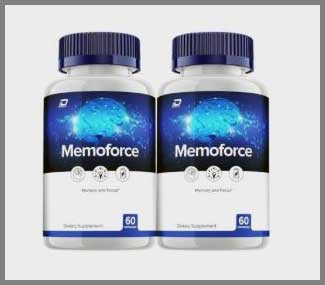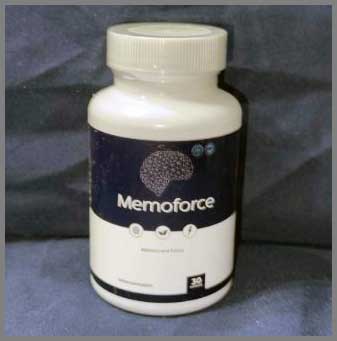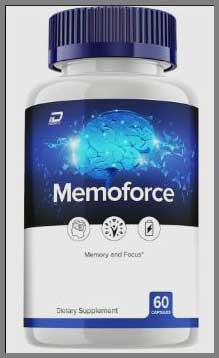
If you’re like me, forgetting names, misplacing keys, or struggling to focus can feel like a daily battle.
That’s why I turned to Memoforce, a natural brain supplement promising to boost memory, sharpen focus, and clear mental fog.
After trying it myself, I’m convinced it’s worth a shot for anyone looking to reclaim their mental edge.
In this article, I’ll share my personal journey with Memoforce, weigh its pros and cons, offer maintenance tips, compare it to other brands, and answer common questions to help you decide if it’s right for you.
My Experience With Memoforce
I’ll be honest—my memory wasn’t what it used to be. At 42, I noticed I was forgetting appointments, struggling to recall names, and feeling mentally sluggish by mid-afternoon. It wasn’t just annoying; it was affecting my confidence at work and home. After reading about Memoforce online, I decided to give it a try, hoping its natural ingredients could help without the jitters of caffeine or the risks of synthetic drugs.
I started with a three-month supply, taking one capsule daily with breakfast. The first week, I didn’t notice much, but I wasn’t expecting a miracle overnight. By week two, I felt a subtle shift—my thoughts seemed clearer, and I wasn’t groping for words as often. For example, during a meeting, I recalled a client’s name without that usual mental scramble. By the end of the first month, I was remembering small details, like where I parked my car or items on my grocery list, with surprising ease.
What struck me most was the lack of side effects. I’ve tried energy drinks and other supplements before, and they often left me wired or queasy. Memoforce felt gentle, like it was quietly supporting my brain without forcing it into overdrive. After three months, I could focus longer on tasks, and my mental energy felt steadier throughout the day.
It wasn’t a complete transformation—I still forgot things occasionally—but the improvement was noticeable enough that my wife commented on my sharper recall. My experience wasn’t perfect, though; I’ll cover some drawbacks later, but overall, Memoforce became a staple in my routine.
Also read: My Thoughts on Seeking Health Vitamins
Pros Of Memoforce
Memoforce has several strengths that make it stand out in the crowded world of brain supplements. Here’s what I found most impressive:

- Natural Ingredients: Memoforce uses a blend of plant-based ingredients like Ginkgo Biloba, Bacopa Monnieri, and Phosphatidylserine, all backed by research for cognitive support. This gave me peace of mind, knowing I wasn’t putting synthetic chemicals into my body.
- Improved Memory Recall: After about a month, I noticed I could recall names, dates, and details faster. For instance, I remembered a colleague’s birthday without checking my calendar, which felt like a small victory.
- Enhanced Focus: My ability to concentrate on tasks, like writing reports or reading long emails, improved significantly. I wasn’t as easily distracted, which boosted my productivity at work.
- No Jitters or Crashes: Unlike caffeine-heavy supplements, Memoforce didn’t leave me feeling wired or drained. It provided a steady mental boost, which I appreciated during long workdays.
- Mood Support: Ingredients like St. John’s Wort seemed to help me stay calm under pressure. I felt less anxious during stressful meetings, which indirectly helped my cognitive performance.
- Long-Term Benefits: Memoforce isn’t just about quick fixes; its neuroprotective properties, like antioxidants, aim to support brain health over time. This made me feel I was investing in my future mental clarity.
- Money-Back Guarantee: The 180-day refund policy gave me confidence to try it risk-free. Knowing I could get my money back if it didn’t work was a huge plus.
These benefits made Memoforce a game-changer for me. The combination of immediate cognitive improvements and long-term brain health support felt like a balanced approach to tackling memory issues.
Cons Of Memoforce
No product is perfect, and Memoforce has its downsides. Here’s what I noticed during my use:
- Slow Initial Results: It took about two weeks to notice any effects, which might frustrate those expecting instant results. Patience is key with this supplement.
- Costly for Long-Term Use: A single bottle costs $69, and while bulk packages offer discounts, it’s still a significant investment if you’re on a tight budget.
- Inconsistent Customer Service: When I had a question about dosage, reaching the company was tricky. Emails took days to get a response, and I never tried calling, but others have reported similar issues.
- Not Universally Effective: While it worked for me, some reviews mention no noticeable improvements. Your diet, lifestyle, or health conditions might affect how well it works.
- Potential Mild Side Effects: I didn’t experience this, but a few users reported mild headaches or digestive discomfort. It’s rare but worth noting, especially if you’re sensitive to supplements.
- Requires Consistent Use: You need to take it daily for optimal results. If you’re forgetful or inconsistent, you might not see the full benefits.
These drawbacks didn’t outweigh the benefits for me, but they’re worth considering. If you’re looking for a quick fix or can’t commit to regular use, Memoforce might not be the best fit.
Maintenance Tips For Memoforce
To get the most out of Memoforce, I learned a few tricks to maximize its effectiveness. Here’s what worked for me:

- Take It Consistently: I took one capsule every morning with breakfast to ensure steady absorption. Missing days can disrupt the cumulative benefits, so set a reminder if you’re prone to forgetting.
- Pair with a Healthy Diet: I noticed better results when I ate brain-friendly foods like salmon, nuts, and leafy greens. Omega-3s and antioxidants complement Memoforce’s ingredients, amplifying its effects.
- Stay Hydrated: Drinking plenty of water helped me avoid mild headaches some users reported. Proper hydration supports brain function and helps the supplement work better.
- Combine with Exercise: I started walking 30 minutes daily, which boosted blood flow to my brain and seemed to enhance Memoforce’s effects. Physical activity is a great partner to this supplement.
- Get Enough Sleep: Memoforce isn’t a substitute for rest. I aimed for 7-8 hours of sleep nightly, which helped my brain process information and maximized the supplement’s benefits.
- Monitor Your Progress: I kept a journal to track memory improvements, like recalling names or tasks. This helped me stay motivated and notice subtle changes over time.
- Consult Your Doctor: Before starting, I checked with my physician, especially since I take other medications. This is crucial if you have health conditions or are on drugs like blood thinners.
These habits helped me make Memoforce a seamless part of my routine. By pairing it with a healthy lifestyle, I felt like I was giving my brain the best shot at staying sharp.
Comparison With Other Brands
When I started looking for a memory supplement, I compared Memoforce to other popular options like Prevagen, NeuroPrime, and Focus Factor. Each has its strengths, but here’s how they stack up based on my research and experience.
Memoforce
Memoforce’s blend of Ginkgo Biloba, Bacopa Monnieri, and Phosphatidylserine impressed me with its science-backed approach. The 180-day money-back guarantee was a big draw, giving me confidence to try it without financial risk. I found it effective for memory recall and focus, and its natural, non-GMO formula felt safe for daily use. However, the $69 price tag for a single bottle and slow initial results might deter some users.
Prevagen
Prevagen relies on apoaequorin, a protein from jellyfish, which claims to support brain cell health. I was skeptical about its efficacy, as studies are limited, and some users reported no benefits. It’s pricier than Memoforce, often costing $75 for a month’s supply, and lacks the diverse ingredient profile of Memoforce. The lack of a robust refund policy also made me hesitant to try it.
NeuroPrime
NeuroPrime includes adaptogens like Rhodiola and Lion’s Mane, which target stress and neuroprotection alongside memory. I considered it for its comprehensive approach, but it’s only available on eBay, which felt less reliable than Memoforce’s official website. Priced similarly to Memoforce, it offers no money-back guarantee, which was a dealbreaker for me. Still, its broader ingredient list might appeal to those seeking stress relief.
Focus Factor
Focus Factor is a budget-friendly option, often under $40, with a wide range of vitamins and herbs. I tried it briefly but found it less effective than Memoforce for memory recall. Its formula feels more like a general multivitamin, lacking the targeted cognitive support of Memoforce’s ingredients. Plus, some users reported digestive issues, which I didn’t experience with Memoforce.
Memoforce stood out for its balance of efficacy, safety, and a generous refund policy. While NeuroPrime offers a broader approach and Focus Factor is cheaper, Memoforce’s targeted formula and transparency won me over.
Read more: My Thoughts on Dr Talbot’s Mucus and Cold Relief
Frequently Asked Questions (FAQ)
It’s tough to crown one supplement as the absolute best since results vary by individual. Memoforce often gets high praise for its natural ingredients like Ginkgo Biloba and Bacopa Monnieri, which have solid research backing their cognitive benefits. In my experience, it outperformed others like Prevagen, but there’s no universal “number one.” Your diet, lifestyle, and health play a big role in what works best for you. Always check with your doctor to find the right fit.
The Mayo Clinic emphasizes lifestyle changes over supplements for memory support. They suggest a Mediterranean diet rich in fish, nuts, and vegetables, regular exercise like walking, and mental exercises like puzzles. They also stress managing stress and getting 7-8 hours of sleep. While they don’t endorse specific supplements like Memoforce, they note that ingredients like Ginkgo Biloba may help some people but lack conclusive evidence for everyone. Consulting a doctor is key, especially for underlying conditions.
Most memory supplements, including Memoforce, are well-tolerated, but side effects can happen. I didn’t experience any, but some users report mild headaches, digestive upset, or insomnia, especially with supplements containing stimulants. Ginkgo Biloba, in Memoforce, may interact with blood thinners or antidepressants, so check with your doctor if you’re on medications. St. John’s Wort can also affect mood-related drugs. Always start with a low dose and monitor how your body reacts.
Memoforce’s pricing varies by package. A single bottle (30 capsules, one month) costs $69. A three-month supply is $177 ($59 per bottle), and a six-month supply is $294 ($49 per bottle), both with free shipping and bonus e-books. I found the bulk options more cost-effective, especially with the 180-day money-back guarantee. Prices are exclusive to the official website, so avoid third-party sellers to ensure authenticity.
Conclusion: For Memoforce
After months of using Memoforce, I can say it’s a solid choice for anyone battling memory lapses or brain fog. Its natural formula, backed by science, helped me stay sharp without side effects. While it’s not perfect, the pros outweigh the cons for me. If you’re ready to invest in your brain health, give Memoforce a try—you might be surprised at how much clearer your mind feels.
